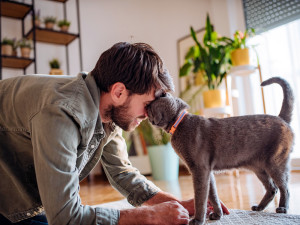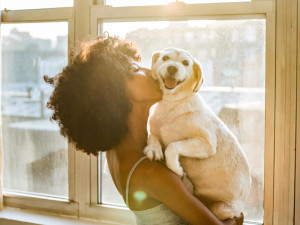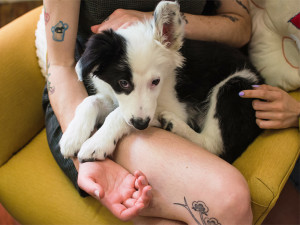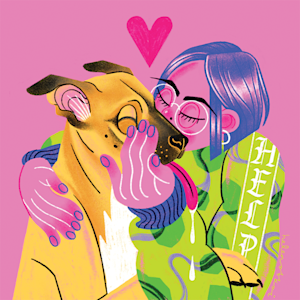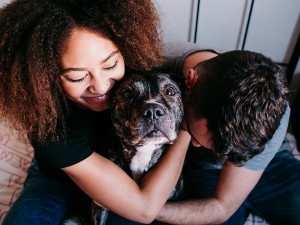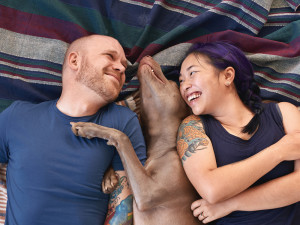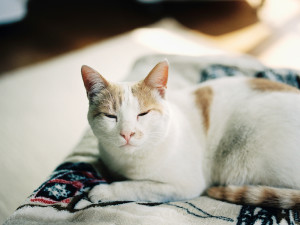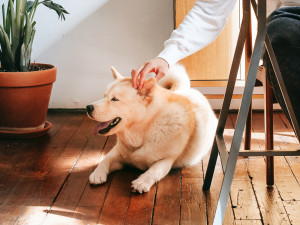Nature vs. Nurture: Does Your Parenting Style Influence Your Pet’s Behavior?
Your personality may actually have something to do with your pet’s personality.

share article
In an early episode of The Sopranos, Tony Soprano asks his therapist Dr. Melfi whether she thinks, because of genetics, his son will inherit his behavioral tendencies, like he did with that of his own mafioso father. “My son is doomed, right?” he asks. But Melfi says no, genetics are only part of the puzzle of what makes up a person. Though your pet might not be hanging out at the Bada Bing (the Sopranos connection is admittedly a stretch — apologies, we’re in the middle of a rewatch), the same is true for them.
While your pet’s behavior is informed by a number of things, including genetics, environment, background, and health, studies show that the way you parent your dog or cat really does make a difference. Let’s take a look at the science behind it.
Studies suggest animals do think of us as their parents.
Before we go further, we’d like to reassure you — you are not in an unrequited relationship with your pet. Studies done on both dogs and cats suggest the bond opens in a new tabbetween pets and their guardians actually mirrors, in some ways, the relationship between human children and their caretakers.
A 2015 studyopens in a new tab showed levels of oxytocin (sometimes referred to as the “love hormone”) rose in both dogs and their human caregivers when they gazed into each other’s eyes, or when the human engaged in petting the dog. This same mutual riseopens in a new tab in oxytocin is seen between parents and newborn children when gazing and touching, and helps build a bond between the two.
And a 2019 studyopens in a new tab showed that cats have distinct attachment styles to their human parents, comparable to those seen in child-parent attachment; this has also been observedopens in a new tab many times in studiesopens in a new tab between dogs and their caretakersopens in a new tab. “In both dogs and cats, attachment to humans may represent an adaptation of the offspring-caretaker bond,” the study's lead author, animal behavior researcher Kristyn Vitale, said in a press releaseopens in a new tab. “Attachment is a biologically relevant behavior. Our study indicates that when cats live in a state of dependency with a human, that attachment behavior is flexible and the majority of cats use humans as a source of comfort.”
These are just a few examples from a growing area of study, so rest assured: You aren’t wrong to consider your pet a member of your family.
Different parenting styles can lead to different behavioral outcomes in dogs.
“Dog breeds can have breed-specific behaviorsopens in a new tab that another breed would either be physically incapable of doing or would greatly struggle to learn how to do,” Lauren Brubaker, a dog behavioral researcher, tells The Wildest. Still, she thinks personal history, which includes how they’re parented, has “the biggest influence on their behavior.”
In a 2022 studyopens in a new tab, published in the journal Animal Cognition, Brubaker and researcher Monique Udell surveyed dog parentsopens in a new tab about their parenting style; specifically, they asked about their expectations for their dogs, and how they typically respond to their dogs’ needs. The results placed them into categories similar to groups already established by those who study the relationship between human children and their parents: “authoritative” (meaning a style of parenting where high expectations are matched by a high responsiveness toward needs), “authoritarian” (where high expectations are met with low responsiveness), and “permissive” (where low expectations matched low responsiveness).
Their dogs underwent three behavioral tests, the first measuring their attachment to their human parent, the second testing their sociability, and the third monitoring their ability to get a treat from a puzzle toy with different levels of help from their parent. The results showed that each parenting style was associated with a different behavioral outcome.
“Authoritative parenting, having high expectations while also being responsive to your dog’s needs can lead to measurable positive outcomes“including increased feelings of security, stress reliance, and problem solving persistence in dogs,” Udell says. These benefits, Udell adds, are similar to those experienced by human children with authoritative parents.
Dogs with authoritarian owners were more insecurely attached to their parents, and dogs with permissive owners were more likely to follow the social cues of a stranger than their parent; neither of these groups had success with the puzzle.
“Some pet parents, for example those with a permissive parenting style, exhibit great warmth and understanding towards their dogs, but may overlook the importance of having high expectations,” Udell says. “In fact, having consistent realistic expectations and rules, engaging in reward-based training, and encouraging problem-solving are all important ways to help your dog build confidence, feel comfortable in their surroundings, and grow in their relationship with you.” The good news is, she says, it’s never too late to start building this deeper connection with your dog.
Cat behavior is also affected by their human.
Dogs aren’t the only ones being influenced by their human parents. A 2019 studyopens in a new tab surveyed cat parents about their personality and the health and behavior of their cats. The humans’ answers were mapped onto a systemopens in a new tab you might be familiar with: the Big Five Inventory (BFI), which evaluates personality in terms of agreeableness, conscientiousness, extroversion, neuroticism, and openness. And — please don’t allow this to stress you out (it’s bad for your cat, apparently) — the study’s results showed a connection between parent personality and certain aspects of cats’ behavior and emotional health.
Increased agreeableness in humans, for example, correlated with friendlier and healthier cats. High conscientiousness was associated with cats displaying less anxious and avoidant behaviors, and high neuroticism scores correlated with increased incidence of stress-related illnesses in cats.
Lauren Finka, one of the study’s authors, previously spoke to The Wildest about her findings. “This study really highlights the potential ways we as owners might impact the behavior and well-being of cats and the important role our personalities might play in relation to this,” Finka says. “Our findings closely mirror those identified within parent-child relationships, suggesting that, just like children, cats are very sensitive to and influenced by the ways we care for and interact with them.”
Like dogs, cats can also build confidence and reduce stress through positive reinforcement-based training with their parents. A visit to the vet is one of the most stressful situations for both cats and their humans (and this stress can sometimes lead to parents avoiding regular vet visitsopens in a new tab altogether).
In a 2018 studyopens in a new tab, published in Applied Animal Behaviour Science, scientists at the University of Veterinary Medicine in Vienna, Austria, 22 cats were split into two groups: half were trained, using their preferred treats, to use their cat carrier for a mock vet visit, half were not. Researchers observed the trained cats were less stressed and made it through their appointments more quickly than the untrained cats, showing that it’s possible to help your cat exist more confidently in the human world.
Don’t stress if you think you’ve parented your pet “incorrectly.”
Brubaker says pet parents shouldn’t worry too much about getting it wrong. “If I could tell pet parents one thing, it would be to love and enjoy your pet, have fun with them, and know that they love you unconditionally,” she tells The Wildest. “If someone is looking to be a better pet parent, I recommend positive reinforcement training classes from a reputable trainer as a great place to start.”
One way to think about training with positive reinforcement, Udell says, is that you’re teaching your pet how to have their needs met in a world where humans control most of the resources. “What we view as misbehavior is often due to a lack of understanding about how to get needs met,” she says. Positive reinforcement is focused on recognition of what your pet wants and needs, and it shows your pet “exactly what behavior is necessary to have a need met, when this outcome is possible (or not), and that you are a trusted source of help.”
Research has also shown, Brubaker says, that playopens in a new tab is an important part of pet behavior and development. “Invest in some fun toysopens in a new tab for your dog or cat so you can play with them!” And finally, she says, make sure your pet gets an appropriate amount of exercise. Your cat might not be able to buy you a “World’s Best Mom” mug, but they will be able to exist a bit more confidently in the world. And what more does a pet parent need?
References:
The Importance of the Secure Base Effect for Domestic Dogsopens in a new tab
Carrier Training Cats Reduces Stress on Transport to a Veterinary Practiceopens in a new tab
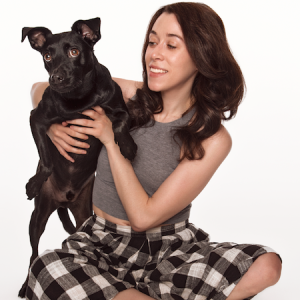
Kelly Conaboy
Kelly Conaboy is a writer and author whose work has been featured in New York Magazine, The New York Times, and The Atlantic. Her first book, The Particulars of Peter, is about her very particular dog, Peter. (Peter works primarily as a poet.)
Related articles
![Couple hugs their merle Boxer]() opens in a new tab
opens in a new tabHow to Improve Your Relationship with Your Dog
Animal behaviorist Dr. Karen B. London on how to strengthen your pet-parent bond.
![Happy pet owners cuddling with their dog]() opens in a new tab
opens in a new tabHow to Spark Joy in Your Dog’s Life
(And your own, while you’re at it.)
![White and light brown cat laying down with eyes almost closed]() opens in a new tab
opens in a new tabStudy Says “Slow Blinking” at Your Cat Helps You Bond
A team of psychologists at the Universities of Sussex and Portsmouth have discovered the key to building a bond with cats.
![]() opens in a new tab
opens in a new tabHow to Read Your Cat’s Poker Face
A guide to their not-so-secret tells.
![Young woman looking at cellphone with her dog]() opens in a new tab
opens in a new tabDoes Your Dog Understand When You FaceTime Them?
It’s a nice thought.
![Unrecognizable man sitting at desk petting his dog]() opens in a new tab
opens in a new tabHow to Pet a Dog — Yes, You Do Need Lessons
There’s a difference between being affectionate and being annoying.
